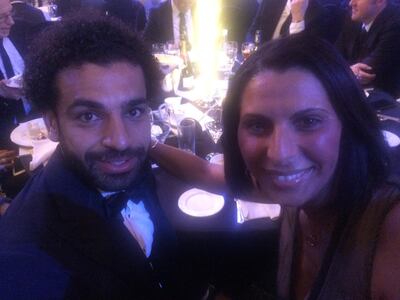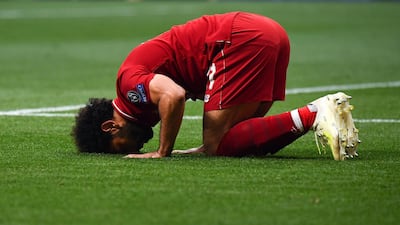There are few more moving sights and sounds in world football than thousands of Liverpool fans swaying as one while singing You'll Never Walk Alone. The anthem says everything about the emotional vitality of a great English city, and how its inhabitants get through adversity by standing together.
Add a charismatic Muslim called Mohamed Salah to the mix, and the effect is even more inspiring. It takes on a universal quality – one that shows that whatever your faith, nationality or personal history, you can succeed in the most unlikely circumstances.
That is certainly how I felt in Madrid last Saturday when Liverpool were crowned European Champions for the sixth time. On a balmy Spanish night when everything seemed possible, I felt intense pride that a fellow Muslim Arab was creating absolute joy.
Salah had opened the scoring against Tottenham Hotspur and, as usual, celebrated it with a very public act of religious devotion. His sujood was the kind that would have been considered unimaginable at clubs such as Liverpool a few short years ago, but today it is movingly routine.
Now the so-called "Egyptian King" and equally devout star teammates such as Sadio Mané, from Senegal, are viewed not only as Scouse folk heroes, but as ambassadors of one of the world's three great monotheistic religions. They not only personify huge talent but the humility and hard work that millions of Muslims aspire to, particularly at a time when Islam faces constant attacks.
Racism abounds, and there are plenty of bigots who try to spread collective guilt against adherents of a religion that is disproportionately caught up in many of the world’s worst problems, ranging from devastating wars to terrorist atrocities. Never mind that Muslims are often the greatest victims of abhorrent acts of evil, they are portrayed in the most negative light possible.
Salah himself was the subject of horrific taunts by Chelsea fans describing him as a “bomber” in April. Their poison was filmed in a bar, and this led to the London club admirably pledging to bring the perpetrators to justice.

In turn, Liverpool Football Club released a powerful statement reading: “The video circulating online, showing vile discriminatory chants being aimed at one of our players is dangerous and disturbing. This behaviour needs to be called out for what it is – unadulterated bigotry.”
Forget the millions that they earn, or that they are household names, I know that Muslims such as Salah and Mané feel as much pain and humiliation as anyone who is victimised because of their faith. I spoke to both men at the Professional Footballers’ Association (PFA) awards, and they explained how Islam was the bedrock to their lives.
At last year’s ceremony, when Salah won the Player of the Year Award, he told me: “God gives me a backbone to my life and I draw considerable determination and strength from my belief. It is heartwarming to see many Muslim players in the Premier League at the moment. Like me, all come from countries with a great football tradition.”
This season’s prestigious PFA event saw Mané, who is a regular visitor to mosques in the north-west of England, tell me: “Being a Muslim means everything to me. I pray at least five times a day, and know what it is like when life is not going well. My faith sees me through, and inspires me to success.”
Mané has been pictured cleaning toilets at the Al Rahma Mosque in Liverpool, and – like Salah – never stops sending money to support good causes in his home country. Neither ever forgets their roots, and both are fierce opponents of discrimination.
Salah is also a much-loved figure in grassroots Liverpool communities, whether visiting patients in local hospitals, or simply strolling around deprived council estates.
It is certainly thanks to role model footballers that there has been profound change in British society. The best-known English clubs are now dominated by Muslims, ranging from N’Golo Kanté at Chelsea and Mesut Özil at Arsenal, to Paul Pogba at Manchester United and Riyad Mahrez at Manchester City.
None conform to the kind of unpleasant stereotypes that project Muslim immigrants as being unable to assimilate. On the contrary, they are approachable, stylish and open to all contemporary mores, whether in their online postings or the kind of tattoos or haircuts they choose to wear.
Perceptions among football crowds have altered, along with behaviour. A new report by the Immigration Policy Lab (ILP) offers evidence compiled by academics at Stanford University, in the USA, and in Zurich, Switzerland, that there has been a marked decrease in Islamophobia thanks to Salah.
Impressive developments range from a near 19 per cent drop in hate crimes in Merseyside – the metropolitan county in which Liverpool is situated – to fans of the Reds halving the number of anti-Muslim tweets they send. In all cases “increased familiarity with Islam” is cited as the driving factor.
I thought about the ILP report – partially titled the “Effect of Mohamed Salah on Islamophobic Behaviours and Attitudes” – as I stood in Plaza Mayor, the romantic heart of Madrid, and once the centre of the largest Christian empire in global history. Beyond the statue of the fabled Catholic King Philip III on a horse, there was a red-and-white banner hanging from one of the sumptuous apartments that surround the square simply reading: “Praise Be to Salah”.
The words – accompanied by an Islamic crescent moon and five stars signifying Liverpool’s first five European Cups – were as incongruous as they were eye-catching, but said everything about how the times are changing.
Mohammed Salah will lead his beloved Egypt when the African Cup of Nations begins in his home country later this month, but he knows that it will not just be fellow Egyptians or Liverpudlians who are behind him. He has touched the lives of millions around the world, and, whatever their colour or creed, all will be cheering for the legendary Muslim footballer, just as we all were on an unforgettable weekend in Madrid.
Nabila Ramdani is a French-Algerian journalist and broadcaster who specialises in Islamic affairs and the Arab world

